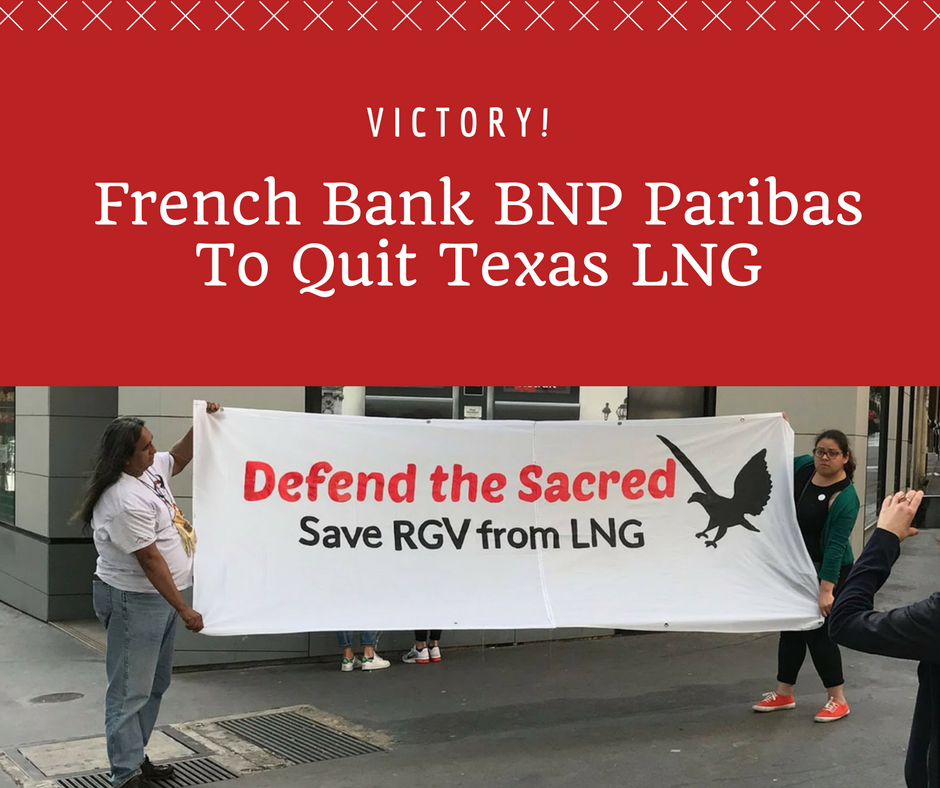
Earlier this year, Chairman of the Carrizo Comecrudo Tribe Juan Macias (left) and Sierra Club Valley Organizer Rebekah Hinojosa (right) traveled to Paris with Rainforest Action Network to pressure the big international banks to say no to Texas LNG projects in the Rio Grande Valley, which would destroy sacred indigenous sites, spew pollution into Valley communities, and scar the pristine Texas gulf coast.
Paris, France-- This morning BNP Paribas, Europe’s second largest bank, announced that it would no longer do business with companies whose primary business activity is connected with oil and gas from shale and/or oil from tar sands. BNP Paribas also announced that it will not finance any oil or gas projects in the Arctic region.
The announcement was welcomed by Rainforest Action Network (RAN), Save RGV from LNG, and Friends of the Earth (FOE) France, who put pressure on the bank for its support of extreme fossil fuel projects, which put the bank out of compliance with ambitions to keep global warming below 2°C by the end of the century.
“BNP Paribas’ new commitment is the most comprehensive oil and gas policy of any big bank, and represents a significant step forward in recognition of the devastating Indigenous rights and climate impacts that result from bankrolling the tar sands, fracked oil and gas from shale, and liquefied natural gas (LNG) terminals that export shale gas,” says Jason Disterhoft, Senior Campaigner at Rainforest Action Network. “Other banks must follow BNP Paribas’ lead and stop extreme fossil fuels. Whether or not they continue to finance dirty energy will be a key test of their seriousness on climate change and human rights.”
RAN, FOE France, and Save RGV from LNG issued a report earlier this year entitled “BNP Paribas vs. Communities and Climate,” condemning BNP Paribas for its support of the Texas LNG export project in the Rio Grande Valley, Texas, and coordinated an Indigenous delegation that traveled from Texas to take their message directly to the bank in Paris.
“We traveled from Texas to France to tell the big banks directly that Texas LNG would destroy our sacred indigenous sites, spew pollution into our communities, and scar our pristine gulf coast,” says Rebekah Hinojosa of Save RGV from LNG. “This is a huge victory for the indigenous and people of color communities in Texas that have been resisting the fossil fuel industry. The fight is not over: Société Générale, another large French bank, should follow BNP Paribas and end support for the Rio Grande LNG terminal proposed for our region.”
BNP Paribas now states its commitment to bringing its financing and investment activities in line with the Paris Agreement, which aims to keep global warming below 2°C by the end of the century. Under the new policy, the bank will not support new exploration, production, transportation and export projects related to tar sands, shale gas, and oil projects in the Arctic. Significantly, the bank has also committed not to finance companies where 30% or more of their business is in these activities.
BNP Paribas will therefore not finance TransCanada’s Keystone XL pipeline, Enbridge’s Line 3, nor any other tar sands pipeline project in North America. BNP Paribas will also not finance Texas LNG or any other liquefied natural gas export terminal or gas pipeline in North America, as most gas for LNG production is slated to come from fracked shale gas.
Jean-Laurent Bonnafé, Chief Executive Officer of BNP Paribas, says: "We’re a long-standing partner to the energy sector and we’re determined to support the transition to a more sustainable world. As an international bank, our role is to help drive the energy transition and contribute to the decarbonisation of the economy. As we have announced, we’re committed to working with and supporting those energy sector partners who have decided to make environmental issues a central part of their business policy.”